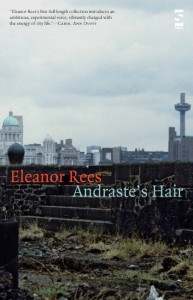 SHORT-LISTED FOR THE FELIX DENNIS BEST FIRST COLLECTION PRIZE (FORWARD PRIZES FOR POETRY 2007 AND THE GLEN DIMPLEX NEW WRITERS AWARDS 2008) Bridging the divide between experimental, performance and traditional poetries the poems in Andraste’s Hair draw on myth, memory, folksong and murder ballad. Often set in a mythical Liverpool, a city of metamorphosis and magic, grotesque and beautiful, its buildings are a backdrop for visions and apprehensions of the past. Liverpool at night is a place where boundaries are crossed in search of knowledge, sexual, historical, and emotional – between life and death.
SHORT-LISTED FOR THE FELIX DENNIS BEST FIRST COLLECTION PRIZE (FORWARD PRIZES FOR POETRY 2007 AND THE GLEN DIMPLEX NEW WRITERS AWARDS 2008) Bridging the divide between experimental, performance and traditional poetries the poems in Andraste’s Hair draw on myth, memory, folksong and murder ballad. Often set in a mythical Liverpool, a city of metamorphosis and magic, grotesque and beautiful, its buildings are a backdrop for visions and apprehensions of the past. Liverpool at night is a place where boundaries are crossed in search of knowledge, sexual, historical, and emotional – between life and death.
Natural and urban landscapes – woodland, city park, dock, terraced street, the river, provide settings for an exploration of the conflict between instinctive and cultured knowledge, between abstract thought and felt experience. The poems are active and forceful – looking for answers they never find. Realities are established and than subverted. Women become trees, cities become men, roads become rivers, night becomes dawn, and the world is constantly transformed, constantly in flux.
Collaborative processes inform the structure of many poems; fusion and the loss of self are preoccupying themes. The poetic voice is remade to articulate what has been discovered in the act of writing. Sometimes erotic, sometimes fierce, sometimes vulnerable the poems fuse a musical sense of language with a grounded vision of the world.
REVIEW QUOTES
| Eleanor Rees’s debut collection offers up a heartfelt hymn to her native Liverpool. Her dense, textured renderings of its landscapes are eloquent, but it is her importunate, ambiguous relationship with the city that provides these poems with their drive. She is at once possessor and possessed: bestriding the rooftops like a descendent of Whitman one moment, breaking “the top from the cathedral … oozing steam/ cream”; diminished and vulnerable, “tarmac … biting at my ankles”, the next. Her urban-pastoral language strongly recalls Nocturne in Chrome & Sunset Yellow, Tobias Hill’s London collection of last year, but Rees’s responses to Liverpool are freer, more impressionistic. A park’s “benches” and “trees” are overlaid with ghosts of the city’s seafaring past, the “you” of the poem “mending ship’s sails on the dilapidated bandstand”; in other poems the city is “ruled by wolves” or devoured by its citizens, “gnawing at bricks … /Gobbling cornice like icing”. Such imaginative freewheeling carries the risk of disorienting the reader, but the coherence provided by the location gives the poems vital integrity.Sarah Crown The Guardian … incantatory, spell-like, trance-inducing – poetry as magical utterance to which you have to submit, make a willing suspension of disbelief …Matt Simpson Stride magazine I love the meaty, muscularity of the poems in this collection. It’s not often you read something engaged with urban life that is intense and personal, rather than sociological and fashionable Frank Cotterell Boyce … an ambitious, experimental voice vibrantly charged with the energy of city life. Carol Ann Duffy Eleanor Rees comes from ‘over the water’, and her poems seem to issue from a lyric country where they do things differently. Instinctive, elemental and ready for anything they twist and coil marvelously between inner and outer worlds, never resting for long in either, always beguiling or unsettling the reader … Paul Farley Rees’s work is completely deserving of its shortlist position, even more so for a voice outside the mainstream. Ross Sutherland Rees comes close to describing the nature of her vision when she writes ‘marrow is all my thinking // as thinking is tired and broken / has no cohesion … thinking thinks too much of itself’. As ‘marrow’ suggests, the core of experience is deep and hidden, and in the romantic-expressionist tradition it is this deep apprehension, not the processes of conscious thought, that most compel her … lusciously, swooningly female in the restless, mobile eroticism that flows throughout the book … The expressionist character of Rees’ work is bold and demanding. She offers nothing that is cheaply mimetic or demotic. Jeffrey Wainwright |
||||||